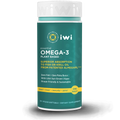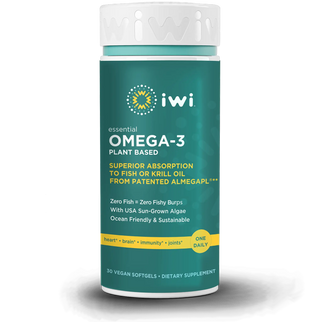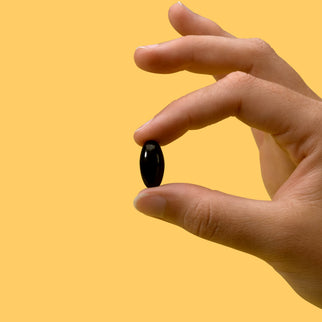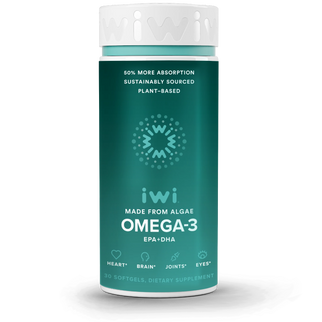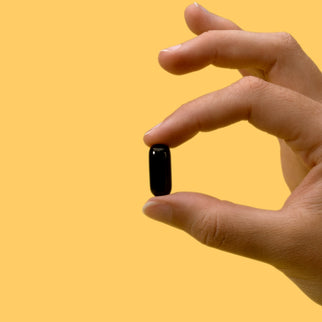If you’ve ever tried to Google omega-3 foods as a vegetarian, you’ve probably encountered some disappointment, as many of the top results mention fish oil supplements or fatty fish.
Fortunately, fish isn’t the only source of omega-3, and vegetarians still have a long list of options. By exploring the best plant-based omega-3 sources, you can craft a diet that gives you all of the necessary nutrients to support your overall health and wellness.
What Is Omega-3?
Omega-3s are a type of polyunsaturated fatty acid found in the human body. These fatty acids play several crucial roles in the body as they form a building block of cell membranes and influence how cells interact. In doing so, they have a key impact on various bodily systems. The three main omega-3 fatty acids are:
- Alpha-linolenic acid (ALA), a short-chain omega-3 precursor
- Docosahexaenoic acid (DHA)
- Eicosapentaenoic acid (EPA)
The most common and popular source of omega-3s is fish, meaning that many vegetarians and vegans are likely missing out on these essential nutrients. Still, it is important to make an active effort to include these healthy fats in your diet because of their importance in the body. Omega-3 fatty acids can provide a wide variety of benefits, like:
- Helping to maintain a healthy blood pressure
- Supporting healthy cholesterol levels
- Supporting healthy cognitive functions, like motor skills and memory
- Helping to maintain healthy joints during the aging process
- Maintaining overall cardiovascular and heart health
- Supporting healthy vision
- Supporting emotional wellness and a more positive mood
What Are the Best Plant-Based Sources of Omega-3?

Whether you follow a vegetarian or vegan diet, you are likely missing out on valuable omega-3 fatty acids. Therefore, it is important that you develop a plan for how you include them in your diet. Fortunately, you still have a wide range of options as a vegetarian — the following are some of the best food sources for plant-based omega-3.
1. Flaxseed
Flax seeds are one of the best sources of ALA omega-3. You can consume flax seeds whole or ground, or you can use flaxseed oil on foods. Just one tablespoon of ground flaxseed has two grams of polyunsaturated fatty acids. Only ground flaxseeds really provide omega-3s, as whole flax seeds go through most people undigested.
When consumed ground, flax seeds also provide a strong source of fiber and phytochemicals called lignans. These nutrient-packed seeds can easily be added to smoothies, included in baking recipes, or even used to make a delicious salad dressing. However, flax seeds do not contain EPA and DHA, which are the most crucial omega-3s.
2. Chia Seeds
Chia seeds are another excellent source of omega-3 in addition to fiber, protein, and calcium. One tablespoon of chia seeds provides around 1.3 grams of ALA omega-3 — but not DHA or EPA. Like flaxseeds, chia seeds are an extremely versatile food, as they can be added to a whole range of foods, like smoothies, yogurt, and even salad dressing.
3. Hemp Seeds
These powerful seeds are often referred to as a superfood because they contain many vitamins and minerals, like vitamin E, calcium, iron, zinc, magnesium, and more. Hemp seeds are also rich in protein, complete with all ten essential amino acids.
In addition to containing about 1 gram of ALA omega-3 fatty acids, but no EPA or DHA, per tablespoon, hemp seeds also contain high levels of omega-6 linoleic fatty acids. These may also benefit heart health and healthy circulation. You can incorporate hemp seeds into your diet the same way you would chia or flax seeds.
4. Plant Oils
You are likely already getting omega-3s unintentionally, as various plant oils contain ALA omega-3s. Options like canola oil, soybean oil, and olive oil are all rich in this essential nutrient.
When you include these oils in your cooking or on your salads, then you may be getting as much as 0.3 grams of ALA omega-3 per tablespoon in addition to antioxidants and fat-soluble vitamins. Keep in mind that oils are high in calories, so you may want to consume them in moderation, and they do not contain EPA or DHA.
5. Edamame
Edamame is immature, green soybeans found either in their pods, shelled, or frozen. These little green soybeans are often considered a superfood because of their high nutrient content. For starters, edamame is highly protein-dense — in just one cup of cooked beans, you can get a total of 18 grams of protein. Edamame is also rich in many other vitamins and minerals, like calcium and magnesium.
Of course, it is also rich in ALA omega-3, but still not EPA or DHA. Edamame contains about 0.3 grams in one-half cup. Simply include this omega-3-rich food in your next stir-fry for a nutrient-heavy dinner, or you can snack on some steamed edamame between meals.
6. Brussels Sprouts
Maybe one of the most controversial items on this list for their taste alone is brussels sprouts. Whether you like them or not, they are an undeniably strong source of the short-chain ALA fatty acid. In just a half-cup of brussels sprouts, you can obtain about 0.4 grams of ALA.
As a leafy, green vegetable, brussels sprouts also contain several other beneficial vitamins and nutrients, like vitamin K, fiber, and calcium. Brussels sprouts are also very high in vitamin C. You can prepare these polarizing vegetables in a variety of ways, like steaming them for a side dish, roasting them with some olive oil, chopping them and adding them to a salad or stir-fry, and more.
7. Algae
This one may catch you by surprise because you probably haven’t thought of including it in your diet, but algae is an excellent way to get the omega-3s you are missing.
Algae is a nutritional powerhouse, as it is also rich in protein, antioxidants, and B vitamins. However, algae is special because it is one of the only vegan sources of omega-3 fatty acids DHA and EPA.
There are many different types of algae that are increasing in popularity, including Spirulina and Chlorella. These types are often found in powder form and are a great addition to smoothies or juices thanks to their rich nutrient profiles, featuring key vitamins and minerals like vitamin A, iron, and zinc.
If you are not yet ready to scoop up a spoonful of algae, don’t worry, as iwi life provides an easy-to-include and completely plant-based omega-3 supplement. With a softgel containing iwi life’s proprietary algal oil, this supplement provides you with all your daily recommended DHA and EPA omega-3 fatty acids. The supplement contains 250mg of combined EPA and DHA omega-3s in just one daily softgel capsule.
8. Seaweed
Seaweed is also a good source of omega-3. Seaweed includes other great nutrients as well, like iodine, antioxidants, protein, iron, and calcium. You don’t have to eat sushi to enjoy seaweed. Many vegetarians enjoy choosing dried seaweed for a convenient crunchy snack or including various types in soups. There are many different species of seaweed, but many of them contain small amounts of DHA and EPA omega-3s.
How Much Omega-3 Do You Need?

The dietary amounts of omega-3 fats you need vary depending on the type. Experts recommend that adult women obtain at least 1.1 grams of ALA omega-3 daily while recommending that men obtain at least 1.6 grams a day. Meanwhile, many experts recommend that adults consume at least 250mg of DHA and EPA omega-3s each day to support overall health and wellness.
Although vegetarians should be mindful of their omega-3 intake in general, it is mostly the case for DHA and EPA. Since there are many sources of plant-based ALA omega-3, there is little reason to worry about obtaining enough through a standard diet.
On the other hand, DHA and EPA are harder to come by since they are found primarily in marine foods. ALA can be converted into DHA and EPA in the body, but only in very small percentages. It is a good idea to maintain a diverse diet, so there is nothing wrong with including several sources of ALA, especially since they include so many additional nutrients.
However, at the end of the day, you still need to obtain DHA and EPA directly through your diet to make sure you are getting enough, which is what makes algae-based supplements so important.
If you have any questions about how to include enough omega-3s in your diet, talk to your healthcare provider or dietitian about what plant-based foods to include. They can help you develop a plan to get the essential fatty acids you need in a way that works best for you, either through supplements or vegan foods.
Include a Completely Vegan Omega-3 Source in Your Diet
If you are on a vegetarian or plant-based diet, it can be more difficult to get some of the important nutrients that you need on a daily basis, like omega-3. However, by being mindful of the nutrients you need and thoughtfully including them in your diet, you can ensure that you are meeting your recommended nutrition and enjoying the health benefits that come with it.
Getting your daily omega-3s doesn’t have to be difficult. For an effective and reliable source of vegan omega-3, look no further than iwi life. With a strong combination of essential DHA and EPA, iwi life supplements can provide a world of potential health benefits. See all of the ways you can benefit from consuming more omega-3s by exploring our complete collection of omega-3 supplements.
Sources:
Flaxseed - Is Ground Better Than Whole? | Mayo Clinic
Omega-3 Fatty Acids - Health Professional Fact Sheet | NIH
Fat Chart & Nutritional Analysis | Canola Oil Info











